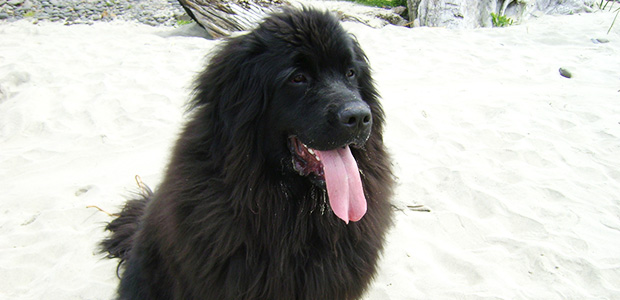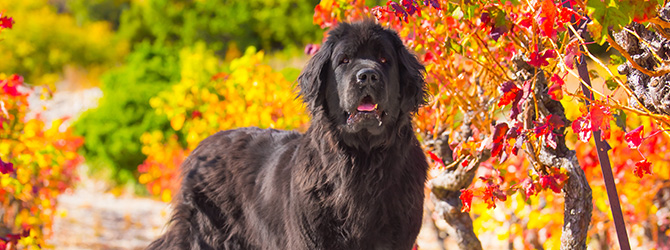The Newfoundland: thinking of getting a Newfoundland?
First Published: 22/10/2019
Last Updated: 21/11/2023
The sweet-hearted Newfoundland is a perfect companion for active families. They’re gentle-natured and love nothing more than an outdoor adventure with their owner.
Place of origin: Newfoundland, East Canada
How big do Newfoundlands get? 63 – 74cm
How heavy are Newfoundlands? 45 – 70kg
Newfoundland Life Expectancy: 8 – 10 years
Colour: Black, Black & White, Grey, Brown
Please note: A dog’s exercise, training/stimulation and grooming requirements can depend on several factors such as age and health. The same goes for ongoing costs of ownership. For advice on one specific dog, we always advise chatting with a vet.
How much exercise does a Newfoundland need?
As traditional working dogs, Newfoundlands will need at least 2 sizeable walks every day. If you’re a keen hiker or love your long walks, a Newfoundland will happily come along with you on your adventures.
Newfoundlands have a history of saving animals and people from water. They’ve also been used by fishermen in the past. Long story short – they love swimming, which can make them rather high-maintenance when it comes to cleaning!
Training: how to train a Newfoundland
The Newfoundland is a big teddy bear: intelligent and eager to please. They’re easy to train, and even easier if you start at a young age.
Bear in mind that an untrained fully-grown Newfoundland will be more difficult than most other breeds because of their huge size! For this reason, it’s important to begin training when your Newfoundland is still young (and small).

Grooming: do Newfoundlands shed?
The Newfoundland’s coat is long, water-resistant and double-layered. They’re moderate shedders but will moult more during moulting season. To keep your Newfoundland’s coat healthy and shiny, brush them 2-3 times a week.
Like most shaggy-coated breeds, Newfoundlands may get lots of mud, crumbs and other particles stuck on their coat. They’re also big droolers so living with a Newfoundland can get messy at times! If you consider yourself to e house-proud, or you don’t like cleaning up any more than is necessary, a Newfoundland may be just the breed for you.
Complete your Newfoundland’s grooming routine with regular tooth brushing, nail clips and ear checks.
Newfoundland temperament, socialising and ideal home environment
Newfoundlands are calm, even-tempered and generally very loving. They’re a great match for active families and it helps if you have lots of living space for them to move around in and explore.
Newfoundlands are typically great with children, although they might be a bit big and clumsy for smaller children.
If you relish the idea of having lots of outdoor adventures with your dog and you don’t mind a bit of mess (and drool) around the house, one of these gentle giants may be just the breed for you.
Cost of owning a Newfoundland
When considering the lifetime cost of owning a Newfoundland, remember to take into account:
- Canine food and diet
- Veterinary care
- Pet insurance
- Kennels or dog sitters
- Regular grooming costs
- Toys and equipment
Need more info?
For more info on finding the best dog breed for you and your lifestyle, have a chat with your vet.
Find your nearest vet using our Find a Vet page, or speak to a vet online using Online Vets.
